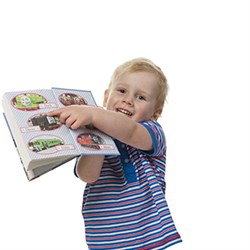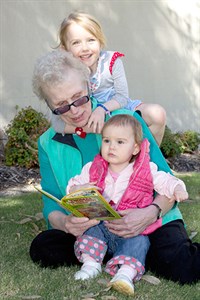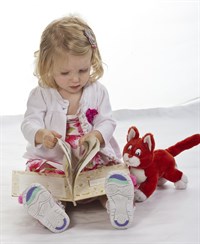 Pull up a chair and pick up a book - your child will thank you!
Pull up a chair and pick up a book - your child will thank you!
by Dr Brad Farrant
Who doesn't love getting stuck into a good book, or finding 5 minutes to yourself for a cuppa and a catch-up on the news of the day or latest magazine chit-chat.
Reading is in everything we do; at work, at home, at business and at play. Our reading ability can determine how well we learn, how well we communicate and how well we live.
But we all have to start somewhere and for our children just how good that start is has the potential to impact on their development for years to come.
There's plenty of evidence to reinforce the value of getting a good start to both reading and listening.
- An Organisation for Economic Co-operation and Development (OECD) study in 2009 showed that 15 year old students who were read to by their parents during their first year of primary school clearly perform better at school than those students who were not read to adequately.
- An Australian Early Development Index finding in 2010 showed that over 32 % of West Aussie kids were starting school without adequate language and learning skills.
Most recently a number of studies undertaken by myself and other researchers at The Kids for Child Health Research have also shown that not only reading, but also talking with your child and sharing language-based encounters, can have a huge impact.
Over a number of years The Kids has been following the progress of a large group of Australian children to determine the ongoing impact of early reading and language development.
Using data collected from the Australian Longitudinal Study of Australian Children, our research team has been able to study the reading patterns of more than 2300 families to see how they impact on a child's overall vocabulary development.
As part of our research we looked at two key factors;
- Joint or shared attention
- Parent-child book reading
Joint or shared attention is when a parent and child are paying attention to something at the same time. The parent then helps the child to learn about the object they are looking at by using words to say its name or characteristic. This helps the child to develop his or her learning by associating the object with a word or meaning, and this facilitates vocabulary development.
Parent-child book reading is when a parent spends the time to either read to their child or have their child read to them. This really is an extension of the joint attention process where children and parents may be pointing to objects or pictures in a book or explaining the words.
Joint attention can begin in the early days of infancy when a parent catches their baby's gaze and uses words to explain what or who they're looking at. This can easily progress as a child responds more to the environment around them.
 Joint attention plays a pivotal role in the 'vocabulary explosion' that occurs in children around the 18-20 month age period and is the basis for helping kids develop their reading skills as they get older.
Joint attention plays a pivotal role in the 'vocabulary explosion' that occurs in children around the 18-20 month age period and is the basis for helping kids develop their reading skills as they get older.
These processes - joint attention and parent-child book reading - are each important factors in their own right in helping our child's development, but our research has found that the dual importance of combining both these learning tools cannot be underestimated.
Over a number of years our research has been investigating whether children who have low levels of joint attention and low levels of parent-child book reading have increased risk of poor vocabulary development . The answer is a clear YES.
So far we have found that children who had low levels of joint attention in the early years were more likely to have poor receptive vocabulary by the time they turned 5 compared to children with good levels of joint attention early on.
In fact our study showed that having low levels of joint attention in infancy increases the risk of poor receptive vocabulary in the early school years by around 70%. (Receptive language is the ability to understand what a word means, not just how it sounds)
Furthermore, children who had low levels of parent-child book reading across early childhood were 2 ½ times more likely to have poor vocabulary at 5 years of age than those kids who received consistent parent-child book reading.
As part of our work we also discovered some important information about;
- how much time should be spent reading
- the range of books available in the home
- whether boys differ from girls
What we found was that most children from an early age need more than 10 minutes parent-child book reading time every day to help them reach good vocabulary levels.
We also discovered that in homes where there were 20 or less children's books available the risk more than doubled for kids in terms of their long term vocabulary development, which may suggest that kids and parents need variety and range to keep them interested in reading.
Our study also showed that boys were at greater risk of poor vocabulary development than girls, reiterating the need for parents to be extra vigilant when it came to reading to, and talking with, their sons.
There is little doubt from our research that there is a key role for both joint attention and parent-child book reading in ensuring our kids get a strong start in their vocabulary development.
Parents play a crucial role in helping their kids understand and verbalise the world they are growing in. Vocabulary doesn't just happen. It takes a lot of work and the earlier that work begins, from infancy onwards, the better our kids will cope with the world around them, not just in school but for many years to come.
Some tips:
- Start young. An infant is fascinated with the new world around them. Show them objects, explain the words, follow their gaze and explain what they are looking at. It's never too early to get involved in joint attention.
- Incorporate joint attention into fun activities and games and everyday activities. During bath time, play time or even cuddle time, use words to explain what it is that has your child's attention. Out and about in the car, shops or park look for what is attracting your child's attention and use words to explain what they are focusing on. This is an ongoing process over time.
- Because children's attention is limited, adults are advised to follow the child's lead as much as possible as to what they are looking at and paying attention to.
There are some very good community programs to help encourage parents to read to their children and one of the best is the Better Beginnings program run by the State Library of WA.
This program includes free literacy packs delivered to families across Western Australia, assistance in determining the right reading material for the age of your child and information for parents on the best reading programs. They also have a great website where you can access information about baby and toddler programs run at your local library. For more info go to www.better-beginnings.com.au

